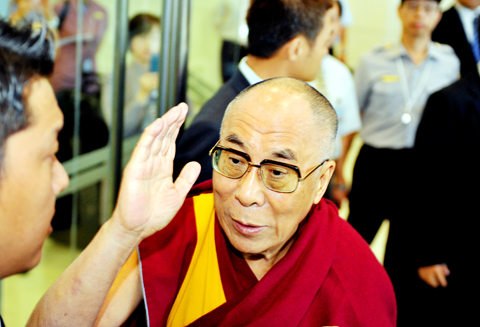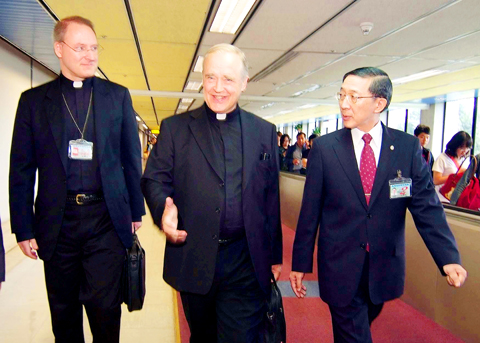The Dalai Lama left Taiwan yesterday after a five-day religious mission.
Tibet’s exiled spiritual leader left from Taiwan Taoyuan International Airport, seen off by more than 100 supporters and monks shouting “Long live the Dalai Lama.”
The Dalai Lama arrived in Taiwan late on Sunday night for a tour primarily aimed at comforting victims of Typhoon Morakot, which battered southern Taiwan last month, killing at least 614 people.

PHOTO: SAM YEH, AFP
Asked whether he thought he would ever be able to return to his Himalayan homeland, which he left half a century ago at the end of a failed uprising against Chinese rule, he said: “We are always ready to go back to Tibet.”
“Of course, every Tibetan always thinks that way,” he told reporters at the airport as he prepared to depart.
Although he said repeatedly that his visit was “non-political,” China voiced its anger and canceled several delegations to Taiwan, including one led by a central bank deputy governor.

PHOTO: CNA
During his stay, the Dalai Lama also had a dialogue with Taiwan’s Catholic leader, Cardinal Paul Shan (單國璽), and held audiences with Tibetan expatriates and local followers of Tibetan Buddhism.
His visit was marred by sporadic demonstrations by pro-unification activists.
Observers said that short-term cross-strait tension was inevitable, but that it would not have a longer-term effect because both Taiwan and China had too much to lose.
“The Dalai Lama’s trip will cause the relationship to cool on the surface, with Beijing cutting down on some activities,” said Hsu Yung-ming (徐永明), a political analyst at Taipei’s Soochow University.
“However, in the long term, the development in ties across the Taiwan Strait will not be affected because it would be bad for both sides,” Hsu said.
The Chinese-language Apple Daily said excessive criticism of the Dalai Lama could backfire on China.
“The more China uses all its resources to suppress a smiling monk, the more international sympathy and welcome he will receive,” it said in an editorial.
After his departure, the Chinese Nationalist Party (KMT) yesterday expressed the hope that exchanges with China would soon get back on track.
The director of the KMT’s mainland affairs department, Chang Jung-kung (張榮恭), said yesterday it would invite high-level officials from China to visit Taiwan next month, with the possibility they would meet with President Ma Ying-jeou (馬英九). Ma will take over the KMT chairmanship on Oct. 17.
The KMT was negotiating with China regarding the group meeting with Ma, he said.
Chang said the Dalai Lama’s visit had had a negative impact on Taiwan-China relations, and said the KMT expected cross-strait relations to return to normal after the Tibetan spiritual leader left.
“We expect the two sides to continue showing sincerity based on the [so-called] ‘1992 consensus’ and goodwill toward each other, and that cross-strait exchanges will return to normal,” he said.
Chang said he was concerned that negotiations between the Straits Exchange Foundation and China’s Association for Relations Across the Taiwan Strait would be affected by the Dalai Lama’s visit.
The Democratic Progressive Party (DPP) said yesterday the Dalai Lama’s visit had been a successful humanitarian mission, but lamented the government’s unfriendly treatment of a respected religious leader.
“The Dalai Lama did exactly what he came to do, which was to pray and bless the victims of Typhoon Morakot. It was immoral of the pan-blue camp to politicize the trip and smear Kaohsiung Mayor Chen Chu’s (陳菊) name,” DPP spokesman Cheng Wen-tsang (鄭文燦) said.
Cheng was one of seven local government chiefs who invited the Nobel laureate to visit.
Cheng also panned the government for its inhospitable reception of the Dalai Lama, such as downgrading his security detail and Ma’s refusal to meet with him, saying such gestures had left the public feeling “uncomfortable.”
In related news, an envoy of Pope Benedict XVI arrived yesterday for a nine-day visit to attend an international humanitarian assistance conference in Taipei and to provide comfort to Morakot survivors.
A Ministry of Foreign Affairs press release said Cardinal Paul Cordes, president of the Holy See’s Pontifical Council Cor Unum, will preside over the Spiritual Exercise for the Leaders of the Church’s Charitable Organization in Asia 2009, which opens on Monday at Fu Jen Catholic University.
Cordes will also visit Kaohsiung and Pingtung counties to convey the pope’s concern for Morakot’s victims, the press release said.
“At a time when reconstruction is being carried out after part of our country was devastated by Morakot, the cardinal’s visit and the holding of the conference will bring great comfort and consolation to our people,” the release said.
ADDITIONAL REPORTING BY JENNY W. HSU

AIR SUPPORT: The Ministry of National Defense thanked the US for the delivery, adding that it was an indicator of the White House’s commitment to the Taiwan Relations Act Deputy Minister of National Defense Po Horng-huei (柏鴻輝) and Representative to the US Alexander Yui on Friday attended a delivery ceremony for the first of Taiwan’s long-awaited 66 F-16C/D Block 70 jets at a Lockheed Martin Corp factory in Greenville, South Carolina. “We are so proud to be the global home of the F-16 and to support Taiwan’s air defense capabilities,” US Representative William Timmons wrote on X, alongside a photograph of Taiwanese and US officials at the event. The F-16C/D Block 70 jets Taiwan ordered have the same capabilities as aircraft that had been upgraded to F-16Vs. The batch of Lockheed Martin

GRIDLOCK: The National Fire Agency’s Special Search and Rescue team is on standby to travel to the countries to help out with the rescue effort A powerful earthquake rocked Myanmar and neighboring Thailand yesterday, killing at least three people in Bangkok and burying dozens when a high-rise building under construction collapsed. Footage shared on social media from Myanmar’s second-largest city showed widespread destruction, raising fears that many were trapped under the rubble or killed. The magnitude 7.7 earthquake, with an epicenter near Mandalay in Myanmar, struck at midday and was followed by a strong magnitude 6.4 aftershock. The extent of death, injury and destruction — especially in Myanmar, which is embroiled in a civil war and where information is tightly controlled at the best of times —

China's military today said it began joint army, navy and rocket force exercises around Taiwan to "serve as a stern warning and powerful deterrent against Taiwanese independence," calling President William Lai (賴清德) a "parasite." The exercises come after Lai called Beijing a "foreign hostile force" last month. More than 10 Chinese military ships approached close to Taiwan's 24 nautical mile (44.4km) contiguous zone this morning and Taiwan sent its own warships to respond, two senior Taiwanese officials said. Taiwan has not yet detected any live fire by the Chinese military so far, one of the officials said. The drills took place after US Secretary

THUGGISH BEHAVIOR: Encouraging people to report independence supporters is another intimidation tactic that threatens cross-strait peace, the state department said China setting up an online system for reporting “Taiwanese independence” advocates is an “irresponsible and reprehensible” act, a US government spokesperson said on Friday. “China’s call for private individuals to report on alleged ‘persecution or suppression’ by supposed ‘Taiwan independence henchmen and accomplices’ is irresponsible and reprehensible,” an unnamed US Department of State spokesperson told the Central News Agency in an e-mail. The move is part of Beijing’s “intimidation campaign” against Taiwan and its supporters, and is “threatening free speech around the world, destabilizing the Indo-Pacific region, and deliberately eroding the cross-strait status quo,” the spokesperson said. The Chinese Communist Party’s “threats